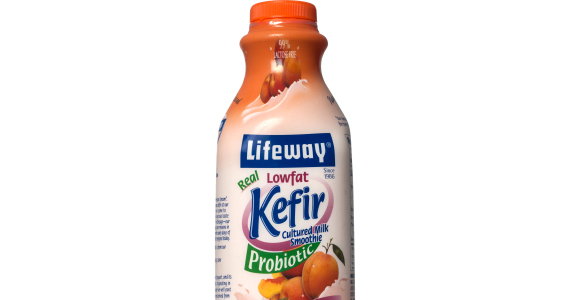Probiotics are beneficial bacteria found in your gastrointestinal tract that help ensure that your entire digestive system stays healthy. Think of probiotics as gut-friendly bacteria that help bring balance to your body's inner ecosystem. Probiotics let healthy bacteria in your digestive tract flourish while simultaneously decreasing the growth of the dangerous kinds of bacteria.
What Foods Provide Probiotics?
Look beyond the yogurt aisle at your nearest grocery store to find these tiny, tummy-taming bacteria. Probiotics are found naturally in fermented foods and some dairy, including yogurt, kefir (a fermented milk product that is often described as a thin, drinkable yogurt), cottage cheese, buttermilk, sourdough bread, sauerkraut, miso, kimchi, soy sauce, and tempeh (cooked, lightly-fermented soybean patty). Opt for unpasteurized sauerkraut because the process of pasteurization kills off the beneficial bacteria.
What Are Some Health Benefits of Probiotics?
While emerging research is constantly unearthing new benefits of probiotics, there are already quite a few well-known health benefits from probiotics. Most people have heard that probiotics are good for your digestive system, which is true. But probiotics can do so much more than that. Probiotics can help prevent and alleviate some of the unpleasant side effects that can come from taking antibiotics, including gas, bloating, diarrhea and abdominal cramps. They can also allow people who are lactose-intolerant to enjoy dairy foods by helping them digest these foods more readily. Probiotics have also been shown to decrease some of the symptoms of irritable bowel syndrome, inflammatory bowel disease and other digestive disorders. Additionally, probiotics play an important role in vitamin synthesis, bolster your immunity by helping your body make antibodies to fight off viruses, reduce allergy symptoms, reduce the chance of getting dental cavities and recover more quickly from yeast infections and urinary tract infections.
How Much Do I Need?
There is no established minimum amount of probiotics you need in a day, and most healthy people can get enough by consuming a well-balanced diet that includes probiotic-rich foods.
What About Probiotic Supplements?
You can buy supplemental probiotics in a variety of forms, including tablets, powders, capsules or in liquid "shots." These supplements come in a variety of formulations and the recommended dose will depend on which type you choose and which brand you opt to buy. There are hundreds of strains of probiotics, and they all work differently in your body. Researchers still aren't sure if they work better as single strains or when combined (containing a variety of individual strains). The amount of microorganisms can vary tremendously from product to product, and different microorganisms work best for specific conditions. You'll need to investigate which strain of bacteria has been scientifically proven to help your health condition and seek out a supplement with that strain. Your best bet is to visit www.ConsumerLab.com, which provides results from independent lab tests regarding a product's actual identity, purity and concentration. Look for the "CL Seal of Approval" on the product's label.
Supplements generally list the amount of live microorganisms as colony-forming units (CFUs). For probiotics to be effective, they need to be labeled as "contains live active cultures." Also, probiotic supplements may not be self-stable, which is why it's best to follow the directions on the package regarding what temperature to store them at and how long they are effective. Of course, it's always better to get your beneficial nutrients from food rather than by popping a pill. Plus, let's be honest--food tastes better than supplements do.
As always, talk with your physician about any dietary supplements you are currently taking or plan on starting. While probiotic supplements haven't been known to cause any adverse side effects, any supplement can potentially interfere with medications or medical treatments.
Kari Hartel, RD, LD is a Registered, Licensed Dietitian and freelance writer based out of St. Louis, MO. Kari is passionate about nutrition education and the prevention of chronic disease through a healthy diet and active lifestyle. Kari holds a Bachelor of Science in Dietetics from Southeast Missouri State University and is committed to helping people lead healthy lives. She completed a yearlong dietetic internship at OSF St. Francis Medical Center in Peoria, IL, where she worked with a multitude of clients and patients with complicated diagnoses. She planned, marketed, and implemented nutrition education programs and cooking demonstrations for the general public as well as for special populations, including patients with cancer, heart disease, diabetes, Alzheimer's disease, obesity, and school-aged children. If you would be interested in working with Kari one-on-one, sign-up for FitDay Dietitian.



